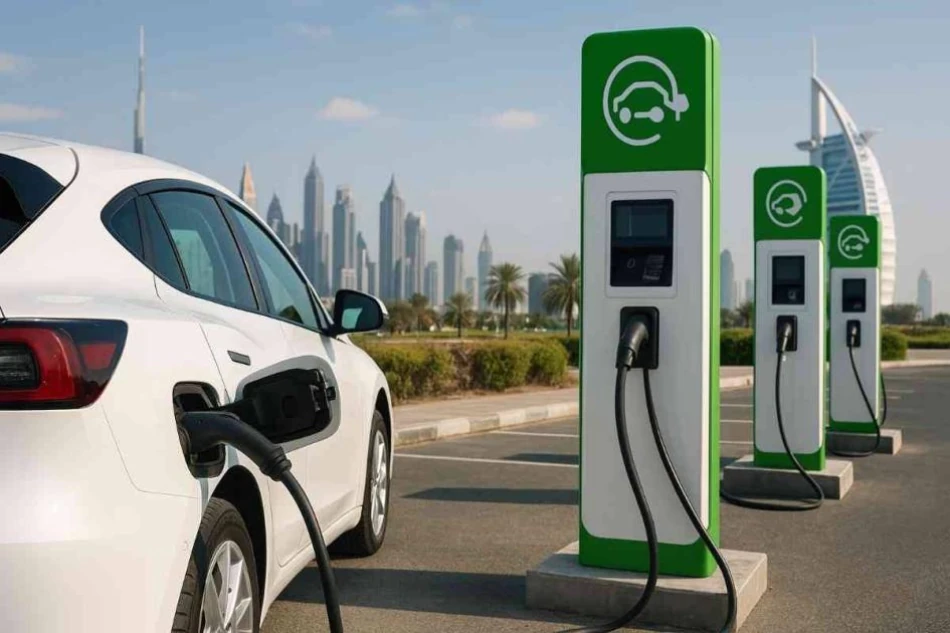
Surge in Demand for Household Electric Vehicle Chargers Fuels Market Growth
UAE electric car owners are increasingly choosing home charging stations over public ones, creating a clear divide between those prioritizing cost savings and convenience versus speed and performance. This shift reflects the growing maturity of the country's electric vehicle market and highlights key decisions facing new EV buyers.
The debate splits along practical lines. Home charging advocates point to lower long-term costs and better control over charging schedules. But critics warn that cheap, non-original home chargers can damage vehicle batteries and reduce performance efficiency.
Home charging stations typically max out at 11 kilowatts per hour, with prices ranging from 1,000 dirhams for basic models to 3,500 dirhams for original manufacturer units. These devices work well for overnight charging but require significant time - often more than 10 hours for a full charge depending on battery capacity.
Anna Tsinter, CEO of Forivo, a company specializing in electric vehicle charging in the UAE, says public fast-charging technology has advanced considerably. Modern cars come equipped with smart battery management systems that control temperature and regulate charging cycles, reducing potential negative impacts on battery life.
"We recently entered the UAE market to distribute public charging stations and noticed significant momentum in this sector," Tsinter explains. "Public charging might be the right solution if you have private parking or live in modern homes, especially villas and standalone houses. But it requires long charging times - averaging 15 hours for a full charge, while public charging stations can reach 80% capacity in just 20-30 minutes."
The speed difference is substantial. Public chargers operate between 30 and 350 kilowatts, with some allowing 80% battery charging in 25-30 minutes. But this comes at higher electricity costs per use.
Bilal Al Hawari, manager of Al Muhandis company for electric car charger sales, notes growing demand from EV owners for home battery chargers. These units range from 7 to 11 kilowatts - low-capacity devices designed for individual use that are economical and easy to operate.
Home charger prices vary from 1,000 to 2,200 dirhams depending on type and specifications. Smart connectivity features or app control capabilities push prices higher. Some chargers allow remote car charging control through phone apps. Installation services by certified technicians start at 750 dirhams including all necessary equipment.
But there are regulatory requirements. In Dubai, installation must be done by technicians certified by the General Electricity Authority. The cables must connect after the electrical meter within a separate electricity line from the meter itself. This ensures compliance with legal requirements and prevents electricity theft.
The installation process requires treating the charger like any household appliance, but with specific technical requirements. Homeowners must ensure their electrical meter can handle the additional capacity and may need to request increased capacity for limited meters. The charging costs get added to regular household electricity bills at standard residential rates.
For high-speed chargers exceeding 30 kilowatts, owners need approval from the electricity authority and must conduct home network load inspections, as these chargers require robust infrastructure.
Saif Al Hammadi, founder of EV GATE electric vehicle maintenance center, warns about quality differences. The main distinction between home and public chargers is the amount of electricity pumped to the car and the varying costs between them.
"Public chargers pump large quantities in short time periods, while home units work with limited capacities," Al Hammadi explains. "What's concerning is some people buying the cheapest non-original home chargers to reduce costs. These devices lack precise power regulation systems, sometimes causing sudden current spikes in less than a second. This creates electrical shock that can burn out the charger or disrupt battery cell balance."
His maintenance center has handled multiple cases of burned chargers or batteries damaged due to poor charger quality. Original chargers cost between 2,500 and 3,500 dirhams, while conventional chargers range from 1,200 to 1,800 dirhams. When factoring in replacement costs and frequent maintenance, original chargers prove more economical long-term, with lifespans reaching four years compared to one year for cheap alternatives.
The financial math varies by usage pattern. Home charging typically adds about 300 dirhams monthly to electricity bills, while daily public charging can cost around 50 dirhams per session depending on battery capacity. This makes home charging more economical for regular users over time.
Proper installation matters as much as device quality. This requires appropriate wiring from the home's main panel to the charger with correct connections. Smart chargers include safety systems that automatically cut power if temperature or current rises too high, protecting both vehicle and home.
The choice ultimately depends on individual circumstances. Home charging works best for villa owners with private parking and predictable daily routines. Public charging suits apartment dwellers, frequent travelers, or those needing quick top-ups during busy schedules. Both options are expanding rapidly as the UAE continues building its electric vehicle infrastructure.
Most Viewed News

 Omar Rahman
Omar Rahman






